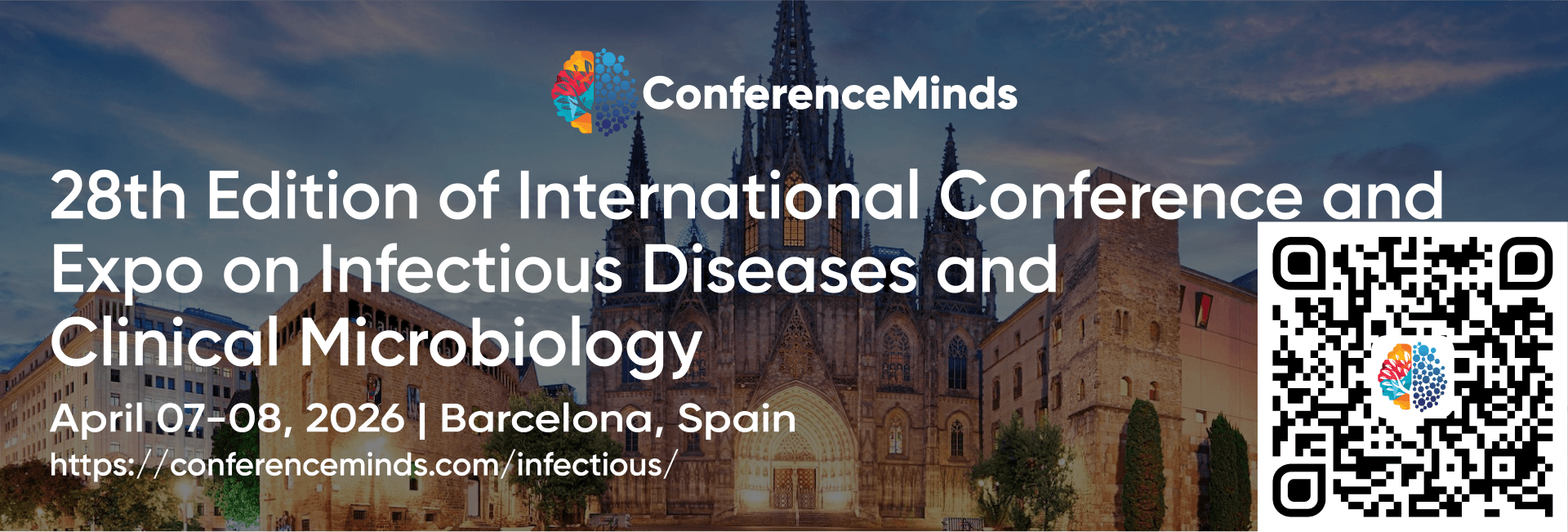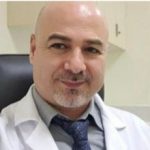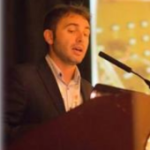Event Date
April 07-08, 2026
Venue
Barcelona, Spain
– Previous Conference Performers / Professionals From Around The Globe –
Media Partners/Collaborator
A huge thanks to all our amazing partners. We couldn’t have a conference without you!



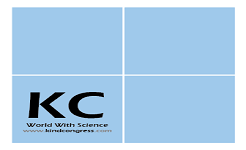



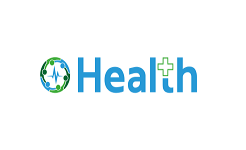


Sponsors/Exhibitors
A huge thanks to all our amazing partners. We couldn’t have a conference without you!


Infectious disease conference 2026
The 28th Edition of the International Conference and Expo on Infectious Diseases and Clinical Microbiology is a premier event which is going to be held on April 07-08, 2026 in Barcelona, Spain, that brings together top researchers, clinicians, microbiologists, and healthcare professionals from across the globe to discuss the latest advancements, challenges, and innovations in the field of infectious diseases and clinical microbiology. The conference will focus on the evolving landscape of infectious diseases, emerging pathogens, antimicrobial resistance (AMR), and novel diagnostic and therapeutic strategies in clinical microbiology. It provides a platform for in-depth discussions, sharing cutting-edge research, and fostering collaboration across disciplines.
An infection is the invasion of tissues by pathogens, their multiplication, and the reaction of host tissues to the infectious agent and the toxins they produce. An infectious disease, also known as a transmissible disease or communicable disease, is an illness resulting from an infection.
Conference Highlights
The conference will cover a range of crucial topics, including:
-
Emerging Infectious Diseases: New and re-emerging infectious diseases, including zoonotic diseases, vector-borne diseases, and pandemics.
-
Antimicrobial Resistance (AMR): Strategies to combat the global threat of AMR, including the development of new antibiotics and alternative treatments.
-
Vaccines and Immunization: The latest advancements in vaccine development, immunotherapies, and vaccine distribution strategies.
-
Global Health and Infectious Diseases: Addressing the global burden of infectious diseases, with a focus on low-resource settings and strategies for global disease control.
-
Diagnostics in Infectious Diseases: The role of point-of-care diagnostics, next-generation sequencing, and biosensors in rapidly detecting infectious agents.
-
Clinical Microbiology Techniques: Advances in microbiome research, genomic epidemiology, and rapid diagnostic tools in clinical settings.
-
Antiviral and Antifungal Therapies: Current and emerging therapies for viral and fungal infections, including the management of HIV, Hepatitis, and antifungal resistance.
-
Infectious Disease Prevention and Control: Strategies for preventing hospital-acquired infections (HAIs) and controlling outbreaks, including infection control protocols and surveillance systems.
Keynote Speakers & Sessions
The conference will feature distinguished keynote speakers who are leading experts in the fields of infectious diseases and microbiology. Attendees will gain insights from their research, clinical experiences, and the latest innovations in diagnostics and treatment.
-
Keynote Presentations: Learn from pioneers in infectious diseases and clinical microbiology about their latest findings, cutting-edge techniques, and future trends.
-
Panel Discussions: Interactive sessions will delve into the challenges of tackling emerging infectious diseases, addressing AMR, and ensuring equitable access to treatments and vaccines.
-
Workshops: Practical sessions focused on diagnostic technologies, epidemiological studies, and clinical applications in microbiology.
-
Poster Presentations: Researchers and professionals will present their innovative research, offering valuable insights into ongoing studies and emerging pathogens.
Networking Opportunities
With a diverse range of attendees, the conference offers ample opportunities for networking and collaboration. Meet and connect with international experts, researchers, clinicians, and industry professionals, exchange ideas, and form partnerships for future research, clinical practice, or public health initiatives.
Who Should Attend?
-
Infectious Disease Specialists
-
Clinical Microbiologists
-
Epidemiologists and Public Health Experts
-
Researchers and Academics in microbiology, immunology, and infectious diseases
-
Pharmaceutical and Biotech Professionals focusing on diagnostics, vaccines, and antimicrobial therapies
-
Healthcare Professionals and Laboratory Technicians working with infectious diseases
-
Students and Young Researchers in clinical microbiology and infectious disease fields
Topics Covered
-
Emerging Pathogens and Global Health: Understanding the rise of new infectious diseases and their global implications.
-
Antimicrobial Resistance (AMR): Tackling resistance to antibiotics, antivirals, and antifungals and exploring alternative treatment strategies.
-
Vaccine Development: Advances in COVID-19 vaccines, tuberculosis, and malaria vaccines, and the future of vaccine technology.
-
Point-of-Care Diagnostics: The role of rapid diagnostics and next-generation sequencing in infectious disease detection.
-
Antiviral and Antifungal Therapy: Latest treatments and challenges in managing viral and fungal infections.
-
Global Infection Control: Strategies for improving infection control, surveillance, and prevention in healthcare settings.
-
Immunology and Infectious Diseases: Understanding immune responses to infections and how immunotherapies can aid in disease treatment.
Why Attend?
- Networking Opportunities: Connect with industry leaders, researchers, and professionals from diverse backgrounds, fostering collaborations and partnerships that can advance your work.
- Cutting-Edge Research: Gain insights into the latest research findings and technological advancements in infectious diseases, microbiology, and public health.
- Expert Speakers: Attend keynote sessions led by renowned experts in the field, providing valuable perspectives on current challenges and future directions.
- Workshops and Sessions: Participate in hands-on workshops and interactive sessions designed to deepen your understanding and practical skills in clinical microbiology and infectious disease management.
- Global Perspective: Engage with attendees from various countries, offering a unique opportunity to discuss international health issues and share best practices.
- Researchers and Academics: Individuals involved in clinical and laboratory research focused on infectious diseases and microbiology.
- Healthcare Professionals: Physicians, nurses, and public health officials who deal with infectious diseases in clinical settings.
- Pharmaceutical and Biotechnology Representatives: Industry leaders showcasing innovative products, technologies, and solutions for infectious disease management.
- Students and Young Professionals: Emerging talents eager to learn from experts and expand their knowledge in the field.
- Policy Makers: Government officials and policy advocates looking to understand the impact of infectious diseases on public health and to develop effective health policies.
Sessions and Tracks
1. Keynote Sessions
Description: Prominent leaders in infectious diseases will share their insights on groundbreaking research, policy developments, and future trends. These sessions set the tone for the conference and provide a comprehensive overview of the field.
2. Microbial Pathogenesis
Description: Explore the mechanisms of microbial infection, including host-pathogen interactions, virulence factors, and immune evasion strategies. This track will focus on the latest research findings that enhance our understanding of how pathogens cause disease.
3. Diagnostic Innovations
Description: This track will highlight advancements in diagnostic techniques, including molecular diagnostics, rapid testing, and point-of-care technologies. Discussions will cover the importance of timely and accurate diagnosis in managing infectious diseases.
4. Antimicrobial Resistance (AMR)
Description: Delve into the global challenge of antimicrobial resistance, examining its causes, implications, and strategies for combating it. This track will feature case studies and successful interventions from various regions.
5. Vaccine Development and Immunization Strategies
Description: Focus on the latest advancements in vaccine research and development, including novel vaccine technologies, clinical trials, and immunization strategies to enhance public health.
6. Infectious Disease Epidemiology
Description: Understand the patterns, causes, and effects of infectious diseases in populations. This track will feature discussions on surveillance, outbreak investigation, and the role of epidemiology in public health policy.
7. Clinical Management of Infectious Diseases
Description: Engage in discussions on best practices for the clinical management of infectious diseases, including treatment protocols, patient care strategies, and infection control measures in healthcare settings.
8. Global Health Challenges
Description: Address pressing global health issues, including pandemics, travel-related infections, and health disparities. This track will focus on collaborative efforts and innovative solutions to enhance global health security.
9. Future Directions in Clinical Microbiology
Description: Explore emerging trends and future directions in clinical microbiology, including the role of artificial intelligence, big data, and personalized medicine in enhancing diagnostic and therapeutic approaches.
10. Global Vaccine Initiatives
Description: This track will focus on global vaccination efforts, examining successful initiatives, barriers to immunization, and strategies to enhance vaccine uptake in diverse populations. Experts will discuss collaboration between governments, NGOs, and healthcare providers.
11. One Health Approach
Description: Explore the interconnectedness of human, animal, and environmental health in the One Health framework. Sessions will highlight zoonotic diseases, environmental factors influencing infectious diseases, and integrated surveillance systems.
12. Novel Antiviral Therapies
Description: Delve into the latest research on antiviral agents, including novel compounds and combination therapies. Discussions will cover mechanisms of action, clinical trial outcomes, and future directions in antiviral drug development.
13. Infection Control and Prevention
Description: This track will focus on best practices in infection prevention and control within healthcare settings. Topics will include protocols for outbreak management, sterilization techniques, and the role of healthcare workers in minimizing transmission.
14. Pediatric Infectious Diseases
Description: Dedicated to infectious diseases affecting children, this track will address unique challenges in diagnosis and treatment. Sessions will explore vaccination schedules, common pediatric infections, and the impact of social determinants on child health.
15. Travel Medicine and Infectious Diseases
Description: As global travel increases, so do travel-related infections. This track will provide insights into the prevention and management of diseases encountered by travelers, including vaccination recommendations and health advisories.
16. HIV/AIDS Research and Treatment
Description: Focus on the latest advancements in HIV/AIDS research, including antiviral therapies, vaccine development, and strategies for prevention and treatment. Sessions will also address stigma and access to care for affected populations.
17. Emerging Technologies in Microbiology
Description: Explore cutting-edge technologies shaping the future of clinical microbiology. Topics will include next-generation sequencing, bioinformatics, and point-of-care diagnostics that enhance disease detection and management.
18. Mental Health and Infectious Diseases
Description: This track will examine the psychological impact of infectious diseases on patients and healthcare workers. Discussions will cover coping strategies, mental health support systems, and the role of mental well-being in recovery.
19. Ethical Considerations in Infectious Disease Research
Description: Engage in discussions about the ethical implications of research and clinical practices in infectious diseases. Topics will include informed consent, data privacy, and the ethical distribution of vaccines and treatments during pandemics.
Market Analysis
The field of infectious diseases and clinical microbiology is rapidly evolving, driven by advancements in technology, rising global health threats, and an increasing emphasis on prevention and control.
Current Trends
- Emerging Infectious Diseases: The COVID-19 pandemic has underscored the importance of surveillance and rapid response to emerging infectious diseases. Continued vigilance is essential in a world where pathogens can cross borders swiftly.
- Technological Innovations: The integration of artificial intelligence, machine learning, and genomic technologies is transforming diagnostics and treatment protocols, allowing for more personalized and effective care.
- Public Health Initiatives: Governments and organizations worldwide are investing in public health infrastructure to improve surveillance, vaccine distribution, and response capabilities for infectious disease outbreaks.
Venue
Barcelona, the dazzling capital of Catalonia in northeastern Spain, is a city where history, art, and modern life come together in perfect harmony. Situated along the Mediterranean coast, it offers an irresistible blend of cultural heritage, stunning architecture, delicious cuisine, and a relaxed seaside atmosphere that attracts millions of tourists every year. The city’s origins date back to Roman times, and traces of its ancient past can still be found today, particularly in the Gothic Quarter, or Barri Gòtic , where narrow, winding streets lead to hidden plazas, medieval buildings, and the majestic Barcelona Cathedral . This historic district captures the city’s old-world charm and contrasts beautifully with the wide boulevards and modern structures that define other parts of the city, such as the elegant Eixample district, known for its grid-like layout and impressive architectural gems.
Barcelona’s architectural beauty is best represented by the works of Antoni Gaudí , the visionary Catalan architect whose unique creations have become symbols of the city. His most famous masterpiece, the Basílica de la Sagrada Família , has been under construction since 1882 and remains one of the most extraordinary churches in the world. Its towering spires, intricate facades, and colorful stained-glass windows create an awe-inspiring experience for visitors. Gaudí’s influence can also be seen throughout the city in landmarks like Park Güell , a whimsical public park decorated with mosaics and organic shapes; Casa Batlló , known for its dragon-like roof and flowing lines; and Casa Milà (La Pedrera) , celebrated for its innovative stone façade and sculpted chimneys. Together, these works have earned Barcelona recognition as one of the world’s greatest architectural cities.
Another highlight of Barcelona is La Rambla , the lively tree-lined avenue that stretches from Plaça de Catalunya to the Port Vell waterfront. It is the heart of the city’s social life, filled with flower stalls, street performers, cafés, and shops. Along the way, visitors can explore the Mercat de la Boqueria , a colorful food market offering fresh produce, seafood, and local delicacies. Near the port stands the Christopher Columbus Monument , a tribute to the famous explorer who once set sail from Spain’s shores. Just a short walk away, the Barceloneta Beach area provides a sunny escape, perfect for swimming, sunbathing, and enjoying seafood by the sea. The nearby Port Olímpic marina, built for the 1992 Olympic Games, has become a popular spot for nightlife, dining, and sailing.
Culture thrives in every corner of Barcelona. Art lovers can visit the Picasso Museum , which houses one of the most extensive collections of Picasso’s early works, or the Fundació Joan Miró , dedicated to the surrealist artist’s colorful creations. For panoramic city views and cultural attractions, Montjuïc Hill is a must-see, home to the Magic Fountain , the National Art Museum of Catalonia (MNAC) , and the Montjuïc Castle . Festivals such as La Mercè and Sant Jordi’s Day showcase the city’s vibrant traditions, while Catalan cuisine—featuring tapas, paella, and crema catalana —adds flavor to every experience.
Barcelona’s blend of ancient charm, artistic brilliance, and seaside beauty makes it one of Europe’s most captivating destinations—a city that truly offers something for everyone.
Why Barcelona?
- Cultural Heritage: Discover the masterpieces of Antoni Gaudí , including the iconic Sagrada Família , Park Güell , and Casa Batlló .
- Beautiful Setting: Enjoy the scenic Mediterranean coastline, charming old quarters, and vibrant plazas filled with life and color.
- Accessibility: Barcelona is well-connected by international flights, with Barcelona–El Prat Airport (BCN) offering easy access from all major global destinations.
- Cuisine and Lifestyle: Experience exquisite Catalan cuisine, lively markets such as La Boqueria , and a unique blend of modernity and tradition.
- Networking in Style: The city’s blend of professional infrastructure and cultural diversity creates an inspiring environment for meaningful discussions and collaborations.
– Tracks & Key Topics –
- Covid 19
- Microbiology
- Clinical Microbiology
- Microbes and Infectious Disease
- Virology
- Clinical Pathology
- Bacterial and Viral Vaccines
- Medical Microbiology
- Food Microbiology
- Industrial Microbiology
- Microbial Genetics
- Microbial Laboratory
- Mycology
- Bacteriology
- Diagnosis and treatment of infectious disease
- Airborne Transmission
- Antibiotics
- Antibody
- Antifungal
- Antigen
- Antimicrobial Resistance
- Antiparasitic
- Antiretroviral Therapy
- Antiseptics
- Antiviral
- Bacterial
- Bacterial Genetics
- Bioterrorism
- Case Fatality Rate
- Chlamydia
- Cholera
- Contact Tracing
- Contagious
- COVID-19
- Cross-contamination
- Cross-immunity
- Dengue
- Disease Surveillance
- Disease Vectors
- Drug-Resistant Pathogens
- E. Coli
- Ebola
- Emerging Infectious Diseases
- Endemic
- Epidemic
- Epidemiology
- Fomite
- Foodborne Illnesses
- Fungal
- Fungal Pathogenesis
- Global Health Threats
- Gonorrhea
- H1N1
- Hand Hygiene
- Hepatitis
- Herd Immunity
- HIV/AIDS
- Hospital-acquired Infections
- Host Susceptibility
- HPV
- Hygiene
- Immune Modulation
- Immune Response
- Immune System
- Immunization
- Immunosuppression
- Incidence
- Incubation Period
- Infection
- Infection Control
- Influenza
- Isolation
- Lyme Disease
- Malaria
- Measles
- Microorganism
- MRSA
- Norovirus
- Nosocomial Infection
- Opportunistic Infection
- Outbreak
- Pandemic
- Pandemic Preparedness
- Pandemic Response
- Parasitic
- Parasitology
- Pathogen
- Pathogen Identification
- Pneumonia
- Polio
- Prevalence
- Public Health
- Quarantine
- Rabies
- Reservoir Host
- Resurgence
- Salmonella
- SARS
- Staph Infection
- Superinfection
- Syphilis
- Transmission
- Transmission Chain
- Tuberculosis
- Typhoid
- Vaccination
- Vector Competence
- Vector Control
- Vector-borne
- Viral
- Viral Genomics
- Waterborne Diseases
- West Nile Virus
- Zika

